- Home
- Catherine Jinks
Pagan's Vows Page 2
Pagan's Vows Read online
Page 2
‘Be honest, now. Are you sure my scalp doesn’t look like a pig’s rump?’
He shakes his head, still smiling. But I don’t believe him. Just because Roland looks all right, it doesn’t mean that I do. Roland would look all right if you rolled him in dung and dragged him through a field of nettles, face down.
Oh well, I don’t suppose it matters. And I shouldn’t be thinking about my appearance, anyway. Monks aren’t supposed to be ornamental – not like the stuff in this sacristy. What a haul! The embroidered linen; the silver candlesticks; the golden vestments.
‘Look at this, will you?’ Picking up a candle snuffer. ‘It looks like topaz.’
‘Put it down, Pagan.’
‘It’s all right, I won’t hurt anything.’
‘Please put it down.’
‘I wonder what those things are for?’ Huge bronze tubs, lined up under the window. ‘Soup, do you think?’
‘Pagan –’
The sudden sound of creaking hinges. Whoops! Here’s the chamberlain. He stops in his tracks, throws back his head, and laughs out loud.
Yes, that’s right, go on, laugh. I know we look like a couple of fools on sticks.
‘Oh-ah!’ he chortles. ‘Those aren’t the best fit, are they?’ He’s balancing a bundle of clothes on his stomach. ‘You’ll do yourselves an injury in those,’ he says. ‘I’d better order some new ones.’
You mean you don’t have any more spares? God preserve us. He dumps his bundle onto a prayer-stool, and extracts a long, trailing garment of black wool. His face is as red as a drunkard’s nose, wide and rugged; he’s practically bald, but his eyebrows make up for it. They look like a pair of drowned kittens glued to a sandstone cliff.
‘This is a scapular,’ he explains. ‘You put it on over your robe. See this hole? Your head goes through there, and you attach your cowl with these strings. Then your shoulder-cape goes on top. Here, I’ll show you.’ Oh no, please, I’ll do it myself. ‘Hold still. That’s it. There.’ (Suddenly smothered in black wool.) ‘Oh-ah. You’re a dainty fellow, aren’t you?’
You mean I’m a skinny little midget. Don’t be shy, just say what you’re thinking.
‘I’ll have a look in the children’s wardrobe,’ he decides. ‘We have oblates here as young as six years old. There might be something in their cast-offs that you can wear until the new stuff comes in.’ (Well thanks. Thanks a lot. That really makes me feel better.) ‘This is your spare pair of drawers,’ he continues. ‘This is your spare shirt. You’ll get five pairs of socks, a pair of sheepskin gloves for winter, and a pair of fur-lined winter boots. With everything else – like that scapular, for instance – you get two of each. Clothes to be washed go in the cloister chest every Thursday. Clothes to be mended go in the chapter-house chest. If you want your boots oiled, bring them to me. Same if you need new drawers. If I’m not here (and I’m away quite a lot, in the summer) you can go to Brother Bernard, the sacristan.’ He moves across to a big carved box under a pile of linen. Shoves the linen onto the floor. Takes a key from the bunch at his waist and fishes around in the bronze keyhole, which guards the box like a silent sentry. At last he flings the lid open. ‘Here are your combs and knives,’ he says. ‘You’ll get your stylus and writing tablet from Brother Clement. Oh, and these are for minor repairs.’ He produces two floppy leather housewives, each containing two needles and a spool of black thread. ‘Anything more serious than a fallen hem, and you take it straight to the chapter-house. Is that clear?’
‘Yes, Father.’
‘Yes, Father.’
‘Now, where did you put your old clothes? Oh. Right. I’ll take care of them. Any questions?’
Yes. Is there a packhorse that comes with all this? ‘Please, Father –’ (Hell. What’s his name? Rainier?) ‘Please, Father Rainier, where should we put everything?’
‘There’s a box under each of your beds. Brother Clement will show you. Ah – and here he is now.’ The chamberlain grins a wide, yellow grin as he turns towards the door. ‘Don’t laugh, Brother, I’ll be ordering new robes for both of them.’
Laugh? Laugh? I don’t think Brother Clement knows the meaning of the word. Look at his face! You could sharpen flints on it. He’s one of those dried-up old hunchbacks who’s had the juice completely wrung out of him. Eyes like chips of ebony; mouth like a trap; two or three strands of white hair clinging to his scalp like cobwebs.
‘Laughter is forbidden by the Fifty-fifth Instrument of Good Works,’ he says, in a voice you could shave your corns with. ‘There should be no laughter in this abbey. Are you finished here, Brother?’
‘For the moment.’
‘Did you describe your duties to these novices?’
‘Well, no –’
‘Brother Rainier is the chamberlain. A chamberlain receives and distributes all tithes, donations and gifts. He is in charge of the abbey finances, and any buying or selling that needs to be done.’ (Every sentence bitten off sharply, despite the old man’s general lack of teeth.) ‘If you would both come this way, I will take you to the novices’ dormitory. At present the novices are studying Saint Benedict’s Rule. Speech is permitted until the bell rings for Sext. This room is normally out of bounds to all novices.’
And off he goes. What a merry old relic. I can see that we’re going to have no end of jolly japes with him. He walks quite fast, for a tottering ruin: his stick raps against the polished tiles of the church floor. A servant with a scrubbing brush scrambles out of his way, as he heads for the south aisle.
‘That is Brother Bernard de Moutiers,’ he announces, nodding at an albino who seems to be scouring the font with a piece of pigskin. ‘Brother Bernard is the sacristan. He looks after the fabric and contents of our church. This way, please.’
Through a door, and into the cloister. Covered walkways on all four sides. A patch of grass in the middle. To our right, against the church’s southern wall, a series of big wooden presses. Clement points his stick at them.
‘That is where the books are stored,’ he says crisply ‘They are in the care of Brother Gerard Bonardin, our precentor.’ He squints around, as if looking for someone. ‘Brother Gerard doesn’t seem to be here at the moment. But over there you can see Brother Montazin de Castronovo, our cellarer.’ (A tall, thin, olive-skinned man, with a hooked nose and iron-grey curls.) ‘Brother Montazin is responsible for the abbey diet, as well as fuel, transport and repairs. Both the guest-master and the keeper of the refectory report to him. The guest-house entrance is to your right: the abbot lives upstairs when he’s not away, as he is at present. Both areas are out of bounds to all novices. The building in front of you is the monks’ dormitory, and the latrines are down there. This way, please.’
Quick march over to the south-east corner, past crowds of chattering monks. Some of them are sharpening knives, some nursing books. One of them seems to have mislaid a forearm.
‘To your left is the refectory,’ Clement continues, plunging into the dimness of a long, straight corridor with a vaulted roof. ‘Meals are served in that room to all brethren, novices and oblates. The kitchens and bakery are on the other side of it. To your right, as I said, is the monks’ dormitory; it can only be reached from the cloister. And this is the herb garden.’
Emerging into another open space. It’s full of mint and fennel, all laid out in tidy rows, and there’s an olive tree planted against the far wall.
‘The infirmary is on the top floor of the building to your left,’ Clement explains, waving his stick around. ‘Underneath it is the almonry, where the poor are received and succoured. Do not tread on the plants, or you’ll regret it. Some of them are very valuable. Mind the step.’
He turns right, and heads for a low, sheltered doorway with a saint carved on the lintel. (Saint Nicholas, to judge from the money-bags.)
‘This is where the oblates sleep,’ he says, stopping abruptly. ‘On no account are you to talk to the oblates. You may exchange bows, but you must not touch them or communicate with them in
any way. Nor may you sit beside an oblate in the church or in the cloister. The penalties for doing so are very, very severe.’
God preserve us. Are we allowed to turn over in bed at night? Or do we have to sleep face down under a pile of gravel? Glance at Roland, but he’s not looking at me. His gaze is firmly fixed on the ground.
‘The last door is your door,’ Clement concludes. ‘It leads to the novices’ dormitory. Notice the depiction of Saint Catherine, patron of all students, carved above it; notice that milk, rather than blood, flows from her severed head. This indicates that we shall all be nourished by the manna of wisdom. ‘For wisdom is better than rubies, and all the things that may be desired are not to be compared with it.’ Kindly wipe your feet before entering.’
Roland goes first. He has to stoop to pass under the lintel. Me next, I suppose. Up one step – wipe my feet – through the door . . .
And into dead silence.
Chapter 3
So this is the novices’ dormitory. Nothing much to look at. A long, low room with beds at the far end. Cross on the wall. Chest under the window. And more cast-off relatives sitting on stools.
‘Benedictus sit Dominus.’ A mumbled chorus, as they lurch to their feet: one full-grown man and five striplings. Most of the young ones look younger than I am.
‘Dominus vobiscum. Dominus vobiscum.’ Clement waves a withered claw. ‘Attention, please. We have two new brothers to welcome – Roland and Pagan. Roland is the son of Lord Galhard Roucy de Bram. Pagan was his squire. They have come to us from Jerusalem.’ (A couple of gasps; a nudge; a look. But no one has the guts to comment.) ‘Since most of you grew up in this abbey, you will be able to help them understand our ways, just as you have been helping Ademar.’ Clement points his stick at the oldest novice, who seems to have burned half his face off. He’s missing one eye and quite a lot of nose; the remaining eye is wet and inflamed. He keeps his head lowered.
‘Ademar is a former layman, as you are,’ Clement informs Roland. ‘He came to us about a month ago, from Castelnaudery. Beside him is Bernard, whom we call Bernard Incentor – Bernard the Tune-setter – because of the voice with which God has blessed him. Bernard was an oblate; he entered this abbey as a little child. So did Raymond, and Gaubert, and Durand. And Amid., of course. Sit down, Amid. I told you not to stand unless you have to.’
Arnie! collapses back onto his stool, wheezing the way a wineskin does when you’re trying to squeeze out the very last drop. Obviously has a bad chest, poor soul. He’s just a wisp of gristle, thin and pale, with bluish lips and fingernails, and big, dark circles under his eyes. Gaubert’s an even sadder case: practically a dwarf, with stunted dwarfs’ legs and a stump for a right hand. But he seems cheerful enough, grinning away down there.
The rest of them don’t look too unhealthy, although Bernard’s pimples are pretty frightening. He’s the tallest of the lot, and by far the greasiest – his dung-coloured hair has a lank, sticky gleam to it, as if it’s been dipped in olive oil. Durand has a big belly and two chins, but he’d look all right if it wasn’t for his tonsure. (Some people just shouldn’t wear tonsures.) Raymond’s the only one who rises above the general atmosphere of desolation, thanks to his solid build and chestnut curls, but I don’t like the way he’s got his nose in the air. Seems to think he deserves to be congratulated for something. His face, perhaps?
‘Fetch two more seats, Bernard – you know where they are.’ Clement lowers himself onto one of the stools, his joints cracking like nut-shells. ‘Everybody sit. Sit. You – Pagan – what are you looking at? Look over here, I’m talking to you. Now, before proceeding, I have to point out for the benefit of newcomers that normally we would be speaking Latin, but because Ademar has no Latin, we are obliged to use the vulgar dialect of this country. Of course Latin is always to be preferred. It is the only civilised tongue. Tell me, Roland, do you have any Latin?’
Roland hesitates, his backside poised above the stool he’s just received. For a moment he’s silent.
‘A little,’ he says at last, and sits down. His face is expressionless. Watch it, Roland. There’s Latin and Latin, you know. Something tells me that yours isn’t the kind they use around here.
‘And Pagan?’ Clement turns his head. ‘What about you? Do you have any Latin?’
‘Yes, I have.’
‘Verbum quid est?’
(Pardon?)
‘Verbum quid est?’
Verbum quid est? What is a verb? What do you mean, ‘what is a verb’? Oh – wait a moment. Wait a moment, I remember now. That’s from Donatus! From the Ars grammatica! How could I have forgotten? Donatus’s Ars grammatica: they must have read it to us about five hundred times, back in Saint Joseph’s. God, those lessons with Brother Benedict. The way he used to thrash us if we didn’t get the questions right. What is a noun? What is a syllable? What is a sentence? I haven’t thought about Donatus in years . . .
‘VERBUM QUID EST?’
Christ in a cream cheese sauce. What is a verb? Think, Pagan. A verb is – a verb is –
Ah yes. A verb is a part of speech with time and person, but without case.
‘Verbum est pars orationis cum tempore et persona sine casu.’
‘Correct.’ Clement nods. ‘It is clear that you do have Latin. Where did you learn it?’
‘In a monastery.’
‘The one in Bethlehem?’
‘Yes.’
A whisper from somewhere behind me. Clement raps his stick on the floor.
‘Silence!’ he snaps. ‘One more word from you, Gaubert, and it’s a four-day fast. So, Pagan. You read Donatus, at this monastery?’
‘Yes.’
‘Yes, Master. You must call me Master.’
‘Yes, Master.’ (God preserve us.)
‘What else did you read?’
‘The Rule of Saint Benedict. Master.’
‘What about Priscian?’
‘No, Master.’
‘Cato? Aesop?’
‘No, Master.’
He grunts, and turns away. What a ravening beast. What a dragon. Be merciful unto me, oh God, for a man would swallow me up.
‘And you, Roland,’ he continues. ‘If I were to say postula a me et dabo tibi gentes hereditatem tuam, what word, do you think, would govern the me most suitably?’
Oh Lord. Poor Roland. This is a disaster. Roland – Roland! Look over this way! Roland! He swallows, and takes a deep breath.
‘The me . . .?’ he says, in a bloodless voice. God have mercy. Just tell him, Roland. Tell him you can’t read. Tell him your only Latin is the Lord’s Prayer. It’s not your fault that you don’t have any grammar. Knights just aren’t raised to read books.
‘Yes, that’s right. The me.’ Clement’s growing impatient. ‘Which word governs the pronoun me?’
‘Deus.’
‘Deus?’
A snicker from Bernard. Shut up, you poisonous bed-louse. Clement’s squinting at Roland as if he can’t believe his eyes. ‘Deus?’ he repeats. ‘You mean ‘God’? Is that what you mean?’
Roland nods.
‘But I don’t understand,’ Clement mutters. ‘Why do you say that?’
‘Because God governs all things.’
This time Bernard laughs out loud. Right. That’s it.
‘Shut up!’ (You pus-bag! You maggot!) Don’t you dare laugh at Roland! Don’t you dare!
‘Silence!’ Whomp! Clement’s stick hits the floor. ‘Pagan! That’s enough. I will not warn you again.’
‘But –’
‘Silence!’ (Whomp!) ‘Are you deaf? Did you hear me? Did I give you permission to speak? In the Rule of Saint Benedict, Pagan, the Fifty-third Instrument of Good Works is ‘not to be fond of much talking’. Kindly remember that.’
Oh really? Well for your information, Needle-nose, I do remember that. And I remember something else, too.
‘But Master, the Eighteenth Instrument of Good Works is “to come to the help of those in trouble”.’ (So there, bog-brain.) ‘Ro
land was in trouble, and I came to his help.’
Gasp. That’s done it. A stifled squeak from Durand. A choking sound from Bernard.
Clement clears his throat.
‘In Chapter Sixty-nine of Saint Benedict’s Rule,’ he growls, ‘it states that in a monastery no one should presume to defend another. “Special care must be taken that under no pretext should one monk presume to defend or uphold –” ’ ‘Yes, but what about Chapter Seventy-two?’ Courage, Pagan. Stand up and speak your mind. Looks can’t kill, after all. ‘In Chapter Seventy-two it says: ‘Let no one follow what he thinks most profitable for himself, but rather what is best for another’. What about that?’
Dead silence. Everyone seems to be holding their breath. Roland throws me one of his long, blue looks, and shakes his head a little. Clement narrows a steely pair of eyes.
‘So,’ he says at last, very slowly and very, very quietly, ‘we have an orator with us. We have a master of argument. How impressive. And tell me, my young Cicero – you who are so learned in the art of discourse – tell me, what are the two kinds of argumentation, according to Boethius? What is a syllogism? What is an enthymeme? What are the five parts of rhetoric? Can you tell me this? Hmm?’
Oh, very funny. Very amusing. ‘No, Master.’
‘No? But surely you must know the thirty-two instruments of verborum exornatio?’
‘Not personally.’ You big fat heap of pigs’ offal. ‘We haven’t been formally introduced.’
A titter from Gaubert. Clement stands up.
‘Then it’s time you were,’ he says, and every word sounds as if he’s spitting out teeth. ‘Come. All of you, come this way. You too, Pagan. This is for your benefit.’
What –? Who –? Where are we going? Out the door. Around the herb garden. Past the refectory. Clement’s stick rapping along just ahead. Bernard, flashing me a sly little grin over his shoulder. Roland, beside me, lending support. The comforting pressure of his hand on my elbow.
Oh, Roland, I think we’ve made a big mistake here.
‘Hurry up,’ Clement barks. He seems to be heading for the church. No, for the guest-house.

 The Paradise Trap
The Paradise Trap A Very Singular Guild
A Very Singular Guild Eloise
Eloise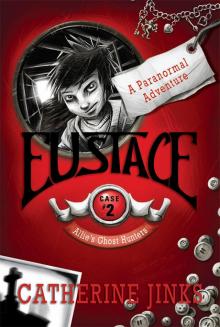 Eustace
Eustace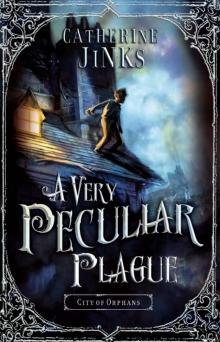 A Very Peculiar Plague
A Very Peculiar Plague Pagan's Crusade
Pagan's Crusade The Gentleman's Garden
The Gentleman's Garden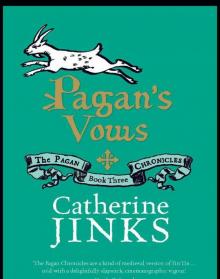 Pagan's Vows
Pagan's Vows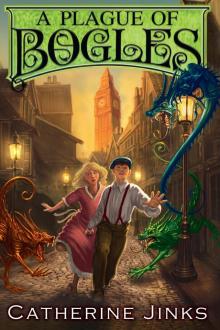 A Plague of Bogles
A Plague of Bogles The Secret Familiar
The Secret Familiar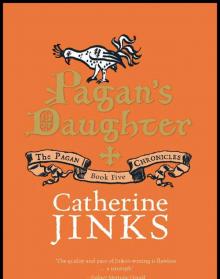 Pagan's Daughter
Pagan's Daughter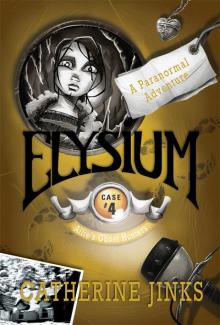 Elysium
Elysium The Reformed Vampire Support Group
The Reformed Vampire Support Group Spinning Around
Spinning Around Pagan's Scribe
Pagan's Scribe Evil Genius
Evil Genius Pagan in Exile
Pagan in Exile Shepherd
Shepherd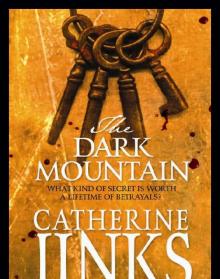 The Dark Mountain
The Dark Mountain How to Catch a Bogle
How to Catch a Bogle Saving Thanehaven
Saving Thanehaven The Genius Wars
The Genius Wars The Abused Werewolf Rescue Group
The Abused Werewolf Rescue Group Theophilus Grey and the Traitor's Mask
Theophilus Grey and the Traitor's Mask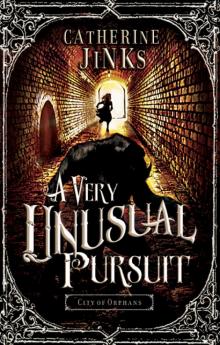 A Very Unusual Pursuit
A Very Unusual Pursuit Genius Squad
Genius Squad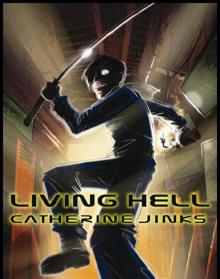 Living Hell
Living Hell The Road
The Road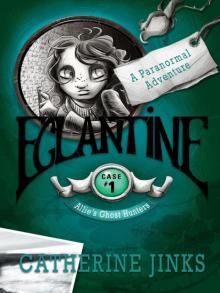 Eglantine
Eglantine